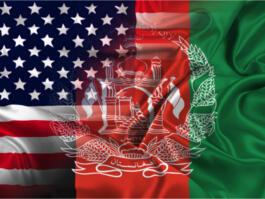Afghanistan: Voters Blame Biden, Not Trump, for Taliban Takeover
Most voters aren’t buying President Joe Biden’s attempt to shift the blame for the Taliban’s sudden takeover of Afghanistan.

Most voters aren’t buying President Joe Biden’s attempt to shift the blame for the Taliban’s sudden takeover of Afghanistan.

Amid reports that Israeli Prime Minister Benjamin Netanyahu may be ousted by a rival political coalition, most American voters don’t think the U.S.-Israel relationship has improved since President Joe Biden took office.

In the wake of Hamas rocket attacks on Israel, most voters believe the risk of war in the Middle East has grown.

U.S. voters tend to see the surprise agreement between Israel and the United Arab Emirates as the breakthrough to peace in the Middle East and are more comfortable than they have been in years with the level of American involvement in the region.

The clock is still ticking on America’s longest-running war. But few voters think the war in Afghanistan has accomplished its mission, and most think it’s unlikely to have a happy ending.

With the Iraqi parliament demanding that the last 5,000 U.S. troops leave its country, many voters here share President Trump’s view that the invasion of Iraq was the biggest American blunder ever. Fewer than ever consider the effort a success story.

Most voters continue to view ISIS as a danger to U.S. national security but remain confident America is winning the war with the radical Islamic State terrorist group. Despite the recent killing of the two top ISIS leaders, however, Democrats are a lot less convinced that America is winning.

Nearly half of voters still regard Syria as important to America’s well-being, but Democrats feel that way much more strongly than other voters.

A prominent Democratic congresswoman has called for cutting U.S. military aid to Israel following the reelection of the “Trump-like” Benjamin Netanyahu as prime minister. But voters here don’t appear ready to do that.

Voters have long considered Israel an ally of the United States, but one-in-five now think we go too easy on them.

Support by several prominent new Democratic members of the House has raised the profile of the effort to punish Israel economically for its treatment of the Palestinians, but few voters are ready to join in.

On the heels of President Trump’s planned removal of troops from Syria, voters are far less likely to think the United States needs to be more hands-on in the Middle East.

President Trump’s declaration that he is pulling U.S. troops from Syria has many worried about the nation’s future at the hands of the radical Islamic State Group (ISIS). He said earlier in the year that the “primary mission” in Syria was to get rid of ISIS and that America had “completed that task.” Voters agree we’re winning the war against ISIS, even if they still consider the terrorist organization a major threat.

President Trump, intent on getting U.S. troops out of the Middle East, has angered hawkish members of both major political parties with his decision to withdraw from Syria. Voters tend to oppose his decision as well.

According to voters, the disappearance and death of Saudi journalist Jamal Khashoggi is a matter of U.S. national security. But regardless of whether voters see this as a national security issue or media overreaction, most support the Trump administration’s plan to organize several Middle Eastern nations into a so-called “Arab NATO.”

If the Saudi government was involved in the death of journalist Jamal Khashoggi, most voters think the nation should be reprimanded by the United States.

As the Israelis and Palestinians clash along the Gaza Strip, voters feel much more strongly these days that the United States should recognize Jerusalem as the capital of Israel.

Israeli Prime Minister Benjamin Netanyahu this week attempted to convince President Trump to pull out of the Iran nuclear deal, one of the only major world leaders to do so. A plurality of voters thought after the 2016 election that Trump would improve relations with Israel, and many now think that has come to fruition.

As President Trump talks to his staff about pulling U.S. troops out of Syria, fewer voters see the war-torn nation as a vital national security interest for the United States. And nearly half continue to believe the best way to handle the Syrian crisis is to leave it alone.

President Trump praised the United States' relationship with Saudi Arabia in a meeting with Crown Prince Mohammed bin Salman, but it appears voters aren't as enthusiastic as the president.